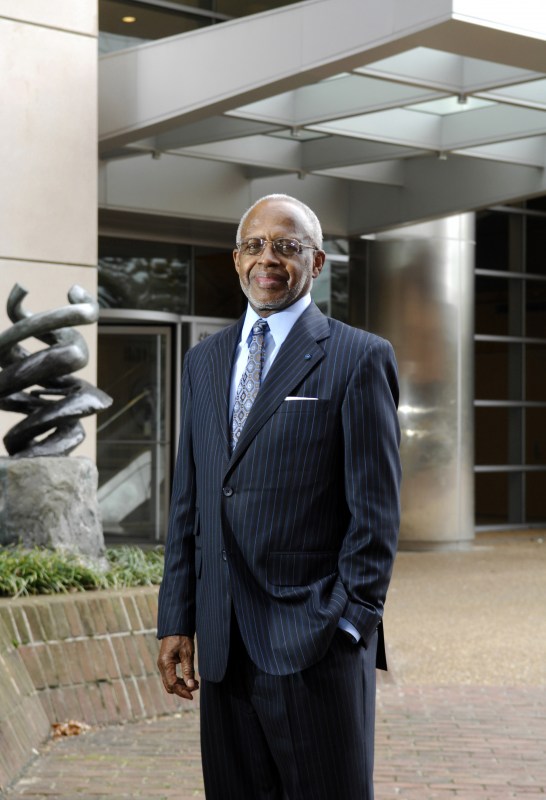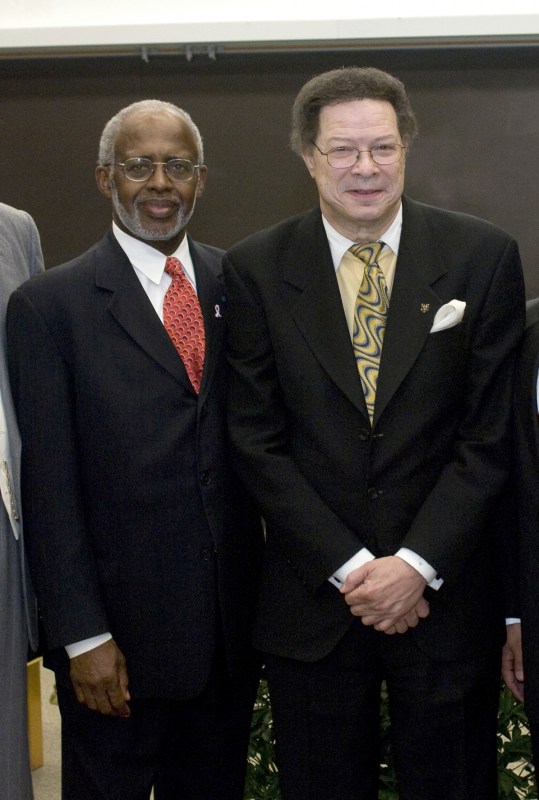
George C. Hill, Ph.D., has been named assistant vice chancellor for Multicultural Affairs. (photo by Anne Rayner)
Hill to assume new VU diversity role
George C. Hill, Ph.D., the Levi Watkins Jr. Professor and professor of Pathology, Microbiology and Immunology, will step down as associate dean for Diversity in Medical Education, effective Sept. 1. Hill will continue to serve the University as assistant vice chancellor for Multicultural Affairs and special assistant to the provost and vice chancellor for Health Affairs.
“I am delighted the University will continue to benefit from Dr. Hill’s wealth of experience. George is a good friend and valued colleague and we look forward to his advice and perspective,” said Richard McCarty, Ph.D., provost and vice chancellor for Academic Affairs.
“He will provide advice and counsel as we continue to develop curriculum and programs for our talented premedical students, especially those from underrepresented groups.”
Since joining Vanderbilt in 2002, Hill has served as associate dean for Diversity in Medical Education for Vanderbilt University School of Medicine (VUSM) and as director for the school’s Office for Diversity in Medical Education.
Beginning Sept. 1, Andre Churchwell, M.D., associate dean for Diversity in Graduate Medical Education and Faculty Affairs, will take on broader responsibility, overseeing all Office for Diversity activities in VUSM.
Under Hill’s leadership, the medical school made significant progress toward increasing the diversity of the medical school class to more broadly represent different races/ethnicities, sexual orientation, economic backgrounds, rural versus urban upbringing, and varying religious backgrounds.
“Dr. Hill’s contribution in expanding the diversity of the medical students at Vanderbilt has been transformative for both the school and for the university,” said Jeff Balser, M.D., Ph.D., vice chancellor for Health Affairs and dean of the School of Medicine.
“Vanderbilt is a better place because of George’s many accomplishments recruiting, mentoring and retaining the best and brightest underrepresented minority students. His efforts have helped the School of Medicine achieve a student body more representative of the changing face of medicine and our nation.”
Implemented in 2002, the initial emphasis of the Office for Diversity in Medical Education was to attract more medical school applications from a broad background, including minority students. Working with administration, faculty and students, this goal has been realized.
Hill was recruited from Meharry Medical College to direct the office and to become VUSM’s first associate dean for Diversity in Medical Education.
At Meharry, he spent 19 years serving in a variety of senior faculty and administrative roles including: dean of the School of Graduate Studies and Research, vice president for Research, associate vice president for International Affairs and director of the Division of Biomedical Sciences.

George C. Hill, Ph.D., left, with Levi Watkins Jr., M.D.
At Vanderbilt, Hill has developed supporters and collaborators from across the institution who together have made significant contributions and progress.
“Our continuing progress would have not been possible without teamwork, collegial relationships and mutual respect. It has enabled us to make data-based decisions to enhance diversity.” Hill said.
Prior to the office’s opening in 2002, VUSM graduated only 20 underrepresented minorities (URM) with an M.D. from 1992 through 2001. In contrast, from 2002 through 2011, the total number of URM M.D. graduates has been 73, representing 54 percent of the total number of URM M.D. graduates since the school’s first minority student Levi Watkins Jr., M.D., graduated in 1970.
To document this progress, Hill and the Office for Diversity in Medical Education produced a comprehensive report in June with data on progress titled, The Changing Face of Medicine, Office for Diversity in Medical Education- 2011.
It also includes information on the many student organizations advancing diversity that are currently supported by the office.
“The Hill report as an entity is well done and thoughtful. The report documents incredible progress at Vanderbilt University in areas of broad diversity including race. I feel very good about what Dr. Hill has been able to achieve in a relatively short period of time,” said Watkins, now associate dean of the Johns Hopkins School of Medicine and professor of Cardiac Surgery.
“Diversity is quite complex. But diversity should not impede or make things more difficult. People of color who went through all of the struggles should not be made to bear the brunt. During the next 10 years Vanderbilt will have to face an even greater challenge to keep diversity moving forward.
To this effort George brings academic and national credibility. We need substance, and this is what George has brought to Vanderbilt,” Watkins said.
Since 2003, the increase in URM applicants to VUSM has been evident. From 2004 through 2010 the total number of URM applicants essentially doubled. VUSM defines URM applicants as being of African- American, Latino/Hispanic, Native-American or Pacific Island descent.
Recruitment and support for students from a broad background has also been the goal.
VUSM continues to emerge as a leader in the recruitment and retention of URM students. Since 2002, a total of 143 URM students have matriculated at VUSM, 73 of these students have received their M.D. or M.D./Ph.D. degrees, and 70 are currently enrolled.
“Continuing to serve Vanderbilt in efforts to increase broad diversity at the institution will be an important commitment, and together with our colleagues we will make progress,” said Hill. “Our institution, and the health and research capacity of our nation is stronger when we achieve these goals. Sustaining our current progress will also further enhance Vanderbilt’s reputation as we train a broad pool of leaders and scholars for the future.”
Hill has led a distinguished career in biomedical research and medical education. His accomplishments to date include: being named a member of the Institute of Medicine of the National Academy of Sciences in 1998; serving as a Fulbright Scholar at the University of Nairobi and as an NIH research fellow at the University of Cambridge, Great Britain; serving as president for the National Foundation for Infectious Diseases, where he also received the organization’s Utz Leadership Award; receiving the Seymour Hunter Prize from the Society of Protozoologists; and also serving on the National Institute for General Medical Sciences Council, the National Institute of Allergy and Infectious Diseases Board of Scientific Counselors.
He has been nominated to serve on the NIH Fogarty International Center Scientific Advisory Board beginning in January 2012.













